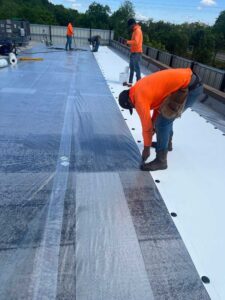
Commercial flat roofing systems are an essential part of any Trumann business property. Understanding the key features, materials used, and benefits of commercial flat roofs, as well as the installation process, maintenance and repair requirements, and choosing a reliable roofing contractor are vital for property owners to make informed decisions.
Understanding Flat Roofing Systems
Key Features of Flat Roofs
Flat roofs are characterized by their horizontal or nearly horizontal design, allowing for increased use of rooftop space. They are commonly found in commercial buildings due to their practicality and cost-effectiveness. Additionally, they provide a modern and aesthetically pleasing appearance to the property.
Flat roofs typically have a layered structure consisting of insulation, a protective membrane, and waterproofing materials. This construction offers enhanced durability and protection against natural elements, such as UV radiation, rain, and wind. Flat roofing systems also provide an opportunity for the installation of solar panels and green roof systems, contributing to energy efficiency and sustainability.
But let’s dive deeper into the world of flat roofing systems and explore some additional details that make them a popular choice for commercial properties.
One of the key advantages of flat roofs is their versatility. The horizontal design allows for easy installation of rooftop equipment, such as HVAC units, solar panels, and satellite dishes. This not only maximizes the use of available space but also provides convenience for maintenance and repairs. With a flat roof, you can efficiently utilize every square inch of your building, making it a valuable asset for businesses.
Moreover, the modern and sleek appearance of flat roofs adds a touch of sophistication to any commercial property. The clean lines and minimalist design create a contemporary aesthetic that is highly sought after in today’s architectural trends. Whether it’s an office building, a retail store, or a restaurant, a flat roof can elevate the overall look and feel of the structure, making it stand out in the urban landscape.
Materials Used in Flat Roofing
Various materials can be used in the construction of commercial flat roofs. The most commonly used options include:
- Modified bitumen: This material consists of asphalt and modifiers that enhance its strength and flexibility. It is highly resistant to extreme weather conditions, making it suitable for commercial properties in Trumann.
- TPO (Thermoplastic Olefin): TPO membranes are highly durable, energy-efficient, and recyclable. These single-ply roofing membranes provide excellent UV resistance and reflectivity, reducing the need for cooling systems and saving energy.
- EPDM (Ethylene Propylene Diene Monomer): EPDM membranes are known for their excellent weather resistance and longevity. They are made of synthetic rubber and can resist high and low temperatures, making them ideal for Trumann’s fluctuating weather conditions.
While these materials offer reliable protection and performance, it’s important to consider the specific needs and requirements of your commercial property when choosing the right material for your flat roof. Factors such as climate, building usage, and budget should all be taken into account to ensure the longevity and effectiveness of your roofing system.
So, whether you’re looking to enhance the functionality of your rooftop space or add a touch of modern elegance to your commercial property, flat roofing systems offer a practical and aesthetically pleasing solution. With a variety of materials to choose from, you can find the perfect fit for your needs and enjoy the benefits of a durable and efficient roofing system.
Benefits of Commercial Flat Roofing
Energy Efficiency and Sustainability
Commercial flat roofing systems offer significant energy efficiency benefits. The reflective surfaces of certain roofing materials, such as TPO, help reduce heat absorption, minimizing the need for excessive cooling systems and lowering energy costs. Additionally, flat roofs provide ample space for the installation of solar panels, further promoting sustainable practices and reducing carbon footprints.
Space Utilization and Accessibility
One of the key advantages of commercial flat roofs is their ability to provide additional usable space. Unlike pitched roofs that limit space utilization, flat roofs offer opportunities for rooftop gardens, outdoor lounges, or even equipment installations. This extra space can enhance the aesthetics and functionality of the property, creating a unique selling point for businesses in Trumann.
Installation Process of Flat Roofs
Pre-Installation Considerations
Prior to installing a commercial flat roof, several factors should be considered. These may include:
- Building codes and regulations: It is essential to comply with local building codes and obtain necessary permits before commencing any roofing project. Consulting with a professional roofing contractor can ensure compliance with Trumann’s regulations.
- Roofing design and structural integrity: Proper assessment of the existing building structure is crucial to determine if it can support the weight of a flat roof. Taking into account snow and water drainage, as well as potential structural reinforcement, is necessary to avoid future issues.
Step-by-Step Installation Guide
The installation process of commercial flat roofs involves several steps:
- Roof surface preparation: The existing roof surface must be thoroughly cleaned and stripped of any existing materials.
- Insulation installation: Proper insulation helps regulate temperature, prevents moisture buildup, and enhances energy efficiency.
- Application of the roofing membrane: The chosen roofing material is carefully installed, ensuring a tight seal and waterproof barrier.
- Flashing and edging installation: Flashings and edgings are essential for preventing roof leaks and water infiltration at vulnerable areas, such as vents and edges.
- Final inspection: A reputable roofing contractor will conduct a detailed inspection to ensure the roof installation meets industry standards and specifications.
Maintenance and Repair of Flat Roofs
Regular Inspection and Maintenance Tips
To ensure the longevity and performance of commercial flat roofs, regular inspections and maintenance are crucial. Consider the following tips:
- Schedule annual or bi-annual inspections by a professional roofing contractor to detect early signs of damage or potential issues.
- Keep the roof surface clean and free from debris, which can clog drains and cause water buildup.
- Trim nearby trees to prevent branches from damaging or scratching the roofing membrane.
- Check for signs of ponding water, cracks, or loose seams that may indicate the need for repairs.
Identifying and Addressing Common Issues
Some common issues that may arise with commercial flat roofs include:
- Leaks and water infiltration
- Ponding water
- Roof membrane damage
- Cracks and splits
- Blistering or bubbling of the roofing material
If any of these issues are detected, it is essential to contact a professional roofing contractor in Trumann for prompt repairs. Ignoring or delaying repairs can lead to further damage and more expensive solutions.
Choosing a Reliable Roofing Contractor in Trumann
Essential Qualities to Look For
When selecting a roofing contractor for your commercial flat roof needs, consider the following essential qualities:
- Experience and expertise in commercial flat roofing installations and repairs.
- Proven track record of successful projects and satisfied customers.
- Knowledge of local building codes and regulations.
- Certifications and licensing to ensure compliance with industry standards.
- Transparent and fair pricing, along with detailed project proposals.
- Warranty and guarantee on materials and workmanship.
Questions to Ask Your Potential Contractor
Before hiring a roofing contractor in Trumann, ask the following questions to ensure they are the right fit for your project:
- How many years of experience do you have in commercial flat roofing?
- Can you provide references from past clients?
- Do you have the necessary licenses and certifications?
- What warranties and guarantees do you offer for your work?
- Can you provide a detailed estimate and timeline for the project?
By selecting a reputable roofing contractor with the right qualifications and expertise, Trumann business owners can have peace of mind knowing that their commercial flat roofs are in good hands.
In conclusion, Trumann commercial flat roofing offers a range of benefits, including energy efficiency, space utilization, and durability. Understanding the key features, materials, installation process, and maintenance requirements is essential for property owners to make informed decisions and ensure the long-term performance of their roofs. By choosing a reliable roofing contractor in Trumann, commercial property owners can have confidence in their flat roof investment and enjoy the benefits for years to come.
Ready to secure your Trumann commercial property with a top-tier flat roofing system? Look no further than Commercial Roofing Rana. With our extensive experience serving the Mid-South since 1983, we specialize in providing industrial buildings, commercial stores, and municipal buildings with the superior protection of our Duro-Last roofing systems. Don’t let water damage threaten your business—trust our licensed team of roofing professionals to deliver quality craftsmanship and durable results. Whether you’re in Memphis, Jackson, Jonesboro, Tupelo, or the surrounding areas, we’re here to assist with your commercial roofing needs. Schedule Now! and let Commercial Roofing Rana protect your investment with our proven expertise and innovative roofing solutions.
